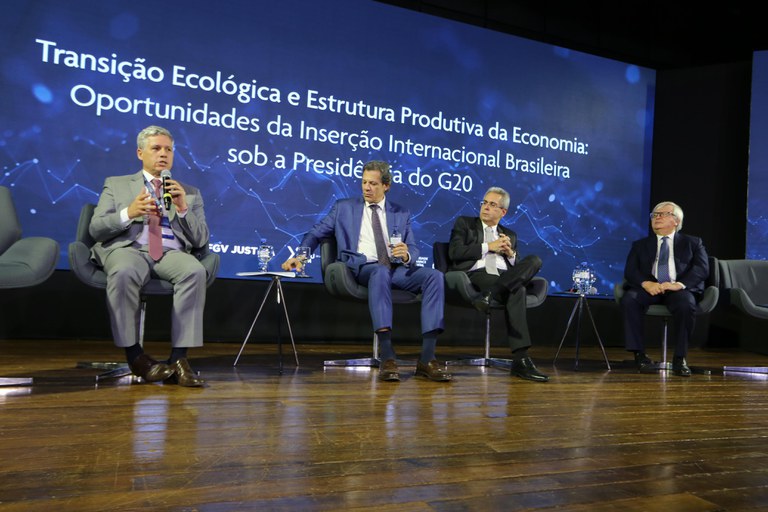Notícias
ECOLOGIC TRANSITION
Stronger integration of agriculture, economy, environmental conservation bolsters healthy growth

Image: Albino Oliveira - Ascom/MDA
Held on the evening of this Wednesday (October 10) during the XXVII International Congress on Constitutional Law, in Brasilia, a panel titled “Ecologic Transition and the Economy’s Productive Structure” (“Transição Ecológica e Estrutura Produtiva da Economia”) highlighted a key discussion for the future of Brazil and the planet. Brazil’s Minister of Agrarian Development and Family Farming (Desenvolvimento Agrário e Agricultura Familiar / MDA) Paulo Teixeira was one of the main voices at the panel, presenting paths for Brazil to connect agriculture and sustainability in building a regenerative, low-carbon economy. The Minister of Finance, Fernando Haddad, and the president of the Supreme Court of Justice (Supremo Tribunal de Justiça / STJ), Herman Benjamin, reinforced the urgent need to integrate sustainability in all productive spheres to counter the intensifying challenges of climate change.
According to Paulo Teixeira, Brazil is facing a climate crisis that demands deep and innovative solutions in the agricultural sector. "We need a sustainable economy capable of transitioning into a green economy," stated the minister. He also highlighted the importance of transforming degraded areas into productive and sustainable spaces, promoting practices that boost productivity and assist in carbon capture.
"We have millions of hectares of degraded pastures that can be restored, allowing carbon capture and increasing agricultural productivity in the same areas," he explained. According to Teixeira, the goal is to adopt regenerative practices, particularly in the agricultural sector, to restore water springs and environmentally protected areas to ensure that the productive sector has access to water supplies, a fundamental resource increasingly threatened by climate change.
Teixeira also underscored the importance of cultivations such as açaí and cocoa, which have much higher profitability than soybeans and extensive livestock farming. “With the Plano Safra ABC de Baixo Carbono [Low-Carbon ABC Crop Plan], we can reduce interest rates for environmental recovery practices in agricultural properties, strengthening a real transition to a low-carbon agriculture,” pointed out the minister, stressing the need for financial and technical support to expand sustainable practices throughout the country.
The urgency of sustainability in the global context
Building upon Teixeira’s statement, Minister of Finance Fernando Haddad emphasized the impact of extreme climate events recorded in Brazil in the past year. "We have lived through devastating floods in the South and severe drought in the Amazon. This scenario imposes an urgent approach to integrate sustainability in all economic areas," he highlighted.
According to Haddad, Brazil is in a unique position to lead the global energy transition, thanks to its significant potential for renewable energy sources like solar and wind, as well as its leading role in biofuel production. "The transition to a green economy is no longer an option, it is an exigency for economic and environmental survival," he stated.
At G20 international meetings, Haddad observed that the discussion always turns towards environmental issues, regardless of the initial theme. "Climate change is a cross-cutting theme that affects the economy as a whole. If we do not integrate sustainable development into all economic policies, the cost of inaction will be unmeasurable."
A circular and sustainable economy
In closing the panel, Justice Herman Benjamin, president of the Supreme Court of Justice, introduced a more encompassing view regarding the relation between economy and ecology. "The ecological transition is not only a matter of technological or economic change, it is a matter of survival," warned Benjamin, highlighting that Brazil, as a climate and water exporter, plays an essential role in ensuring sustainability not only for itself but for the world as a whole.
Justice Benjamin also stressed the need for a circular economy in which products are conceived to be reused and recycled, instead of being discarded. “Without the forests, there will be no water, and without water, agricultural production will be no longer viable,” stated the justice, reminding the audience that ecological processes do not depend on humanity to regenerate, but society depends on nature to survive.
Brazil as a leader in green transformation
The panel highlighted that Brazil has the unique opportunity to lead a green transformation that not only elevates the country in the global economic scenario but also sustainably preserves its natural riches. In his final considerations, Minister Paulo Teixeira underscored the key role the country plays in this movement: "Brazilian agriculture is at a pivotal moment. Through regenerative practices, we can balance productivity with preservation, transforming degraded areas into sources of both ecological and economic value. Brazil can —and should—be a global example of how development and sustainability work together."
Experts in the panel underscored that strengthening the integration among agriculture, the economy, and environmental conservation is key to bolstering sustainable growth and taking advantage of the productive potential of recovered areas. As highlighted by Fernando Haddad and Herman Benjamin, this transition has ceased to be a choice to become an urgent necessity. With continuous investments in a green economy, Brazil can establish itself as a global reference, demonstrating that it is possible to thrive in harmony with nature.
In the face of the climate scenario and the demands for sustainability, the country now has the opportunity to redefine its trajectory in a unique way, becoming a role model for the whole world.